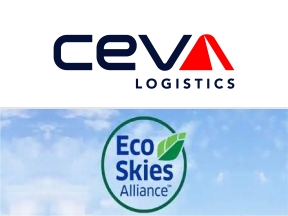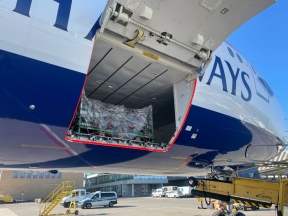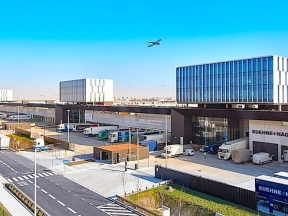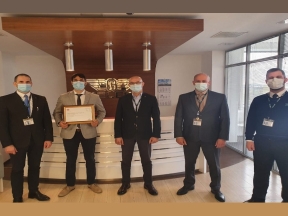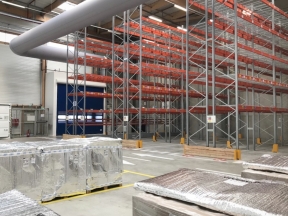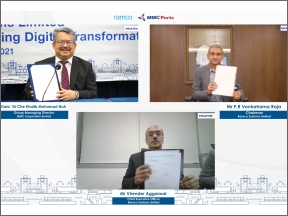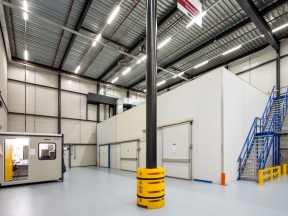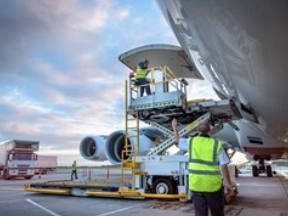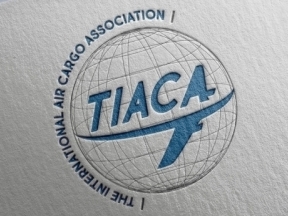CEVA Logistics has joined United Airlines’ Eco-Skies Alliance, a first-of-its-kind program involving leading global corporations working with the airline to power future flying in a more sustainable way. CEVA Logistics and other Eco-Skies Alliance leaders will work with United to collectively purchase approximately 3.4 million gallons of sustainable aviation fuel (SAF) this year. With nearly 80 per cent emissions reductions on a life-cycle basis compared to conventional jet fuel, this is enough SAF to eliminate approximately 31,000 metric tons of greenhouse gas emissions, or enough to fly passengers more than 200 million miles. As an inaugural participant, CEVA Logistics is taking a lead in the air cargo industry to reduce the logistics-related impact on the environment at the source by creating demand for more SAF. In addition to the Eco-Skies Alliance program, which is designated for corporate customers, United is also inviting individual customers to join in the airline’s efforts by contributing funds to purchase SAF, which United will use to help lower the greenhouse gas emissions from its flights compared to traditional jet fuel. Says Mathieu Friedberg, CEO, CEVA Logistics, “At CEVA, we deliver responsive logistics for our customers, and as part of the CMA CGM Group, we’re strongly committed to acting for the planet in the areas of climate change, air quality and biodiversity. With our participation in the United Eco-Skies Alliance, CEVA is taking tangible action today, with an eye on the solutions of tomorrow. Offering a SAF option to our air cargo customers in partnership with United demonstrates CEVA’s commitment to a more sustainable supply chain. We applaud the participation of each member of the Alliance.” Scott Kirby, CEO, United, adds, “While we’ve partnered with companies …
Read More »IAG Cargo moves 2.5 million doses of COVID-19 vaccines into Latin America and the Caribbean
Continuing its efforts to transport COVID-19 vaccines across the world, IAG Cargo has delivered 2.5 million doses into Latin America and the Caribbean since January. The shipments were transported using IAG Cargo’s specialist Constant Climate service via its airside hubs at London Heathrow and Madrid Barajas, two of its three specialist pharmaceutical GDP certified hubs, to the approved Constant Climate stations in the region. Daniel Byrne, Regional Commercial Manager – UK & Ireland at IAG Cargo said, “We are delighted to be able to support Latin America and the Caribbean with their vaccine rollout – a region that is a key part of our network. With our sister airlines, British Airways and Iberia we’ve already transported vaccines into El Salvador, Mexico and the Dominican Republic, and we partnered with Crown Agents to support the delivery efforts into several British Overseas Territories including Bermuda, Cayman Islands and Turks and Caicos. With our world-class cool chain facilities supported by highly trained teams and a seamless service we are committed to supporting the logistics to deliver COVID-19 vaccines in the Latin American and Caribbean region, and worldwide.” Fergus Drake, CEO, Crown Agents, adds, “In the global race to secure doses of the Covid-19 vaccine, we strike to ensure no country gets left behind. We’re proud to be working with IAG Cargo to ensure even the most remote regions of the globe get their fair share of the vaccine.”
Read More »Brussels Airport opens 50,000 sq m logistics building at Brucargo West
A new 50,000 square metres logistics building for the handling of goods was officially opened, after two years of constructions work, at the west side of Brucargo. The building provides large refrigerated storage areas and offers direct airside access, with three logistics companies operating out of the facility including Kuehne+Nagel, Worldwide Flight Services and Expeditors. “Brucargo West not only provides additional first-line facilities for handling activities (WFS), increasing maximum capacity but also anchors the airfreight activities of two global logistics service providers (Expeditors and Kuehne+Nagel),” the airport says. Brussels Airport boasts over 100 logistics companies making it the second most important logistics hub in Belgium, after the Port of Antwerp, for international trade, according to Brussels Airport. Centrally located amongst major industrial centres in Belgium, the logistics area of Brussels Airport is a crucial driver of economic growth in the country and its regions. The airport saw nearly 650,000 tonnes of cargo transported in 2020. Brussels Airport has invested a total of EUR 100 million in the construction of ultra-modern logistics buildings including the Brinks building for the storage of valuable goods. With the new facility, Kuehne+Nagel (K+N) is expanding its activities at BRU for the handling of perishables including temperature-controlled storage and transportation of flowers, vegetables and fruit. The new infrastructure is particularly suited for the handling of pharmaceuticals, such as vaccines, which is one of the niche markets Brussels Airport has specialised in. The airport has over 30,000 sqm of refrigerated storage space. Brussels Airport says K+N’s hub in Brucargo complements the company’s global network of 90+ KN PharmaChain GxP certified air logistics stations. Also tapping the new facility, Expeditors is significantly expanding its healthcare logistics in Europe …
Read More »Celebi gets IATA CEIV Pharma certification for Hungary’s cargo operations
Çelebi Ground Handling Hungary has successfully completed the all evaluations and audits and received CEIV Pharma Certification for cargo/warehouse operations. Since the start of Covid-19, Celebi Aviation has been taking all necessary actions and making necessary implementations and developments for ensuring the safest transportation environment while the handling of medical aid, especially Covid-19 vaccines. “With our enhanced facilities and ground support equipment, we are more than ready to meet all the expectations. As one of our developments in cargo business we are glad to announce Celebi Ground Handling Hungary is awarded with IATA CEIV Pharma Certificate,” the company said in a statement. IATA had created the Center of Excellence for Independent Validators in pharmaceutical logistics (CEIV Pharma), to help organisations and the entire air cargo supply chain to get on the right track to achieve pharmaceutical handling excellence. CEIV Pharma addresses industry’s need for more safety, security, compliance and efficiency, by the creation of a globally consistent and recognized pharmaceutical product handling certification. By establishing a common baseline from existing regulations and standards, this certification ensures international and national compliance to safeguard product integrity while addressing specific air cargo needs.
Read More »Bollore Logistics to open a new pharma unit at Paris Charles de Gaulle Hub
Following the increased demand for healthcare shipments during the pandemic, Bolloré Logistics is reinforcing its healthcare product processing facilities with an 800 m2 extension of a pharmaceutical unit with a temperature of 15 degree Celsius to 25 degree Celsius. With the new unit, Bolloré Logistics now boasts a surface area of 2,200 m2 at its Roissy CDG Hub, divided into three temperature-controlled areas of 2 degree Celsius to 8 degree Celsius, 15 degree Celsius to 25 degree Celsius, and -20 degree Celsius. These facilities are reserved exclusively for processing healthcare product shipments in a secure environment managed by teams trained in Good Distribution Practices (GDPs). Three dedicated dock doors ensure the seamless and temperature-controlled flow of goods for total mastery of the cold chain during operations. The new cell also has a racked area with a 550-pallet capacity as well as a mass storage area. The new facility increases Bolloré Logistics’ capacity to manage cross-docking operations and respond to the specific requirements of each product category, including vaccines and nuclear-medicine products. “This investment demonstrates our determination to support the health sector in its logistics challenges. Our facilities and solutions are specially designed to respond to requirements on regulations and operational excellence and are adapted to each category of goods transported,” said Pascal Le Guevel, Director of the Bolloré Logistics Roissy CDG Hub. Bolloré Logistics implements solutions that ensure the safety and integrity of products, including power connections for active containers, monitored unit temperatures, temperature mapping and staff training. The warehouse responds to all the requirements of European GDPs for pharmaceutical products. “With this environment, we are able to deliver complete and needs-adapted solutions to all our customers, from the preparation …
Read More »DHL Express adds capacity between Asia Pacific, US and Europe, offering 2350 tonnes every week
To serve growing demand between Asia Pacific and the U.S. and Europe, DHL Express has strengthened its flight network using its Boeing 777 freighters to offer weekly capacity of almost 2,350 tonnes. With over 1,730 tonnes of capacity per week, DHL’s dedicated flights operated by Kalitta Air will cater to increased demand for express logistics services from Oceania. AeroLogic will add 610 tonnes of capacity as it flies six times a week to and from Leipzig via Hong Kong, Singapore and Bahrain. DHL Express’s South Asia Hub in Singapore as the common point of transit will help to consolidate and facilitate deliveries from Asia Pacific to the US and Europe. Operated by DHL Express’ partner airline Kalitta Air, one of the aircraft is flying five times a week from the United States to the DHL Express South Asia Hub in Singapore, via Sydney. From Singapore, the aircraft will make stops in Hong Kong and Japan before returning to the US. In addition, Kalitta Air will operate a new flight route that plies between Singapore and Sydney six times a week. The other aircraft – operated by AeroLogic, the joint venture cargo airline of DHL Express and Lufthansa Cargo – will fly six times a week from Leipzig to Hong Kong and Singapore before making a stop at Bahrain and returning to Leipzig. By scheduling both Kalitta Air and AeroLogic flights to cross load in Singapore places a growing significance of the South Asia Hub, which serves as a conduit for Oceania customers looking to expand their reach to the rest of Asia Pacific, the US and Europe. The new dedicated flights and aircraft will also help to strengthen DHL’s service …
Read More »MMC partners with Ramco Systems to digitally transform five ports in Malaysia
MMC Corportation Berhad (MMC) has embarked on a major digital transformation of five ports, in partnership with global software solutions leader, Ramco System. The digital transformation will consolidate and standardise processes of MMC’s ports, which include Pelabuhan Tanjung Pelepas Sdn Bhd (PTP), Johor Port Berhad, Northport (Malaysia) Bhd, Penang Port Sdn Bhd and Tanjung Bruas Port Sdn Bhd. The group-wide transformation was awarded based on the successful implementation of Ramco integrated Enterprise Resource Planning (ERP) system at one of Malaysia’s most advanced container terminal – PTP. This technological transformation programme will propel Malaysia to the forefront of global best-in-class ports – which plays a crucial role in mitigating supply chain challenges, including recent disruptions due to COVID-19. Building on an earlier implementation by Ramco Systems of an ERP system for PTP where about 90 per cent of the system has achieved Go-Live in phases over the past 10 months, the enhanced rollout will digitalise processes, while providing real-time business information. MMC will also be able to consolidate various business support functions (namely Finance, Human Resource, Enterprise Asset Management, Supply Chain Management, and Logistics Management) across ports into a single integrated ERP system – all accessible on an integrated dashboard. Over 8,000 MMC employees across the ports will be plugged into the platform on their computers/mobile devices which now eliminates duplication errors and other bottlenecks, allowing efficient business processes and enhanced data visibility. The system will also include smart features such as Artificial Intelligence and Machine Learning (AI/ML), which will provide employees with greater insight as well as predictive alerts and chatbots which can reduce human error and save time. This will lay the foundation for MMC’s broader strategy to enhance …
Read More »CEVA Logistics launches FORPATIENTS, focusing on healthcare logistics services
In an expansion of its support for global healthcare and pharmaceutical customers, CEVA Logistics has announced a new sub-brand, FORPATIENTS, to support better patient outcomes through the company’s broad range of healthcare logistics services. CEVA FORPATIENTS offers healthcare and pharmaceutical companies end-to-end logistics solutions that place the patient at the center of the supply chain. As part of the suite of solutions, the company is also introducing a new temperature-sensitive logistics product that will begin service in the second quarter of 2021. The CEVA FORPATIENTS suite of healthcare logistics now encompasses temperature-sensitive solutions, pharma and biopharma, medical devices, consumer health, hospital and home care as well as diagnostic and laboratory services. Centralising its global healthcare offerings under the FORPATIENTS umbrella gives greater visibility of CEVA Logistics’ range of services to its customers and assures them of the central position of the patient. The company is also launching an advertising and social media campaign to show how logistics solutions support common medical procedures and healthcare needs. The new CEVA Logistics’ solution requires investment in temperature-controlled facilities around the world. With the support of its parent company, the CMA CGM Group, a world leader in shipping and logistics, CEVA has committed to operating a network of more than 40 such airfreight stations by the end of 2021. Some of the stations will also offer other services, such as contract logistics support. In all, the stations will allow CEVA to not only service major healthcare gateways in regional markets, but also to supply more than 1,450 healthcare trade lanes globally. Through the global network, CEVA will welcome a broad range of customer shipments in conjunction with its temperature-sensitive packaging solutions, including active and …
Read More »Cargo Agency Conference to give freight forwarders right of speech in IATA’s air cargo programme
The Cargo Agency Conference (CAC) has decided to give freight forwarders a stronger voice in the development of CAC resolutions. This is the result of a newly adopted resolution of the CAC that will require consultation with Regional Joint Councils before any future resolutions (or amendments to resolutions) are proposed to and considered by the CAC. The CAC is composed only of airlines. The Regional Joint Councils are composed of local freight forwarder associations affiliated with the International Federation of Freight Forwarders Associations (FIATA), as well as individual freight forwarders and airlines. Obtaining Regional Joint Council views in advance of adopting resolutions will strengthen the Air Cargo Program by ensuring the efficient global implementation of resolutions. “This is a major improvement for all concerned. The air cargo program works to improve the safety, security, and efficiency of cargo distribution. Considering the views of all interested parties at the beginning of the decision-making process is a win-win. The freight forwarders and their associations will have a stronger voice to influence the process. The CAC will be able to make better decisions with broader input to the decision-making process. And once decisions are made, they can be implemented universally with stronger support from all parties,” said Muhammad Albakri, Senior Vice President for Customer, Financial and Digital Services, IATA. The new streamlined consultation process will help to run the Air Cargo Program more efficiently, reduce costs, and improve and enhance cargo distribution performance throughout the industry. This is particularly crucial during these times of a global pandemic and economic crisis. IATA is the secretariat for the CAC.
Read More »TIACA urges for action plan on challenges faced by the air cargo industry
The International Air Cargo Association (TIACA) has called for action to address five critical challenges being faced by the air cargo industry, which are digitalisation, sustainability, security, liberalisation and collaboration. The organisation has completed a year-long transformation program which has created a forward-looking association well positioned to unite and represent all sectors of the supply chain, reflecting its broad membership composition. “The industry has demonstrated over the last 12 months, how effective it can be when all the supply chain partners unite around a common objective, supporting the global community through the Covid pandemic. Our industry came together initially by transporting PPE and other life essentials and then mobilized to provide the only effective transport mode to support global vaccine distribution” stated Glyn Hughes, Director General, TIACA. TIACA has identified key industry priorities that will need to be embraced by the entire supply chain in order to modernize and continue to provide enhanced solutions addressing shipper and other customer demands. “TIACA is committed to working with its members, the broader industry, association partners and government agencies to ensure we have a united and successful air cargo industry. We have demonstrated considerable success over the past months but as we go forward new challenges will materialize. We will need be more innovative, agile and focused as an industry to overcome them.” states, TIACA, Chair
Read More » Cargo Breaking News
Cargo Breaking News
